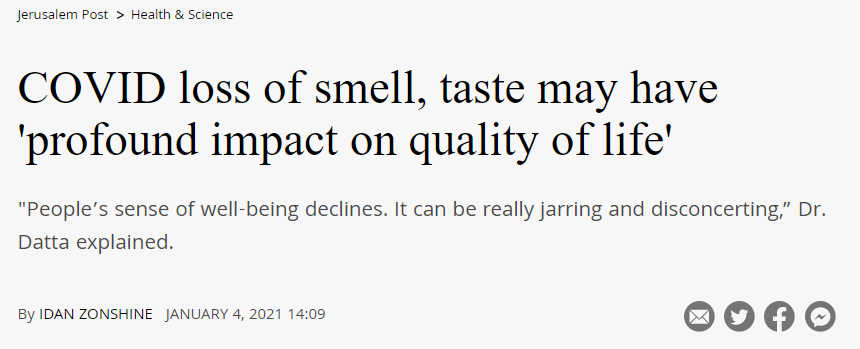The most prevalent indication that a person is infected by the deadly Coronavirus is the loss of taste and smell. Clinical reports show that patients regain their sense of taste and smell after they recover, but for some, the loss continues and may be permanent. According to a Neurobiology professor at Harvard Medical School, losing the sense of taste and smell can have an extensive impact on a Covid-19 survivor’s quality of life that may lead to nutritional deficit, anxiety and depression, among others. In a recent study done on some patients in Germany discovered that “smell training” or sniffing essential oils such as lavander, eucalyptus, cinnamon and chocolate may be helpful in bringing back the olfactory senses.
Jerusalem Post: Potential immediate loss of the senses of smell and taste, patients have also been reporting symptoms of drastic changes to their perceptions of flavors and to their overall appetite, leading to fears of nutritional deficits

According to Jerusalem Post’s report, as worldwide coronavirus cases top 85 million, the report features some experts who fear that the pandemic may leave huge numbers of people with a permanent loss of smell and taste.
Some COVID-19 survivors are tormented by phantom odors that are unpleasant and often noxious, like the smells of burning plastic, ammonia or feces, a distortion called parosmia.
Last month, a research team in Barcelona found that in addition to the loss of senses, many coronavirus patients reportedly experienced severe nasal irritation and dryness in conjunction with the beginning of their sensory loss, which lasted for around 12 days.
Dayton 247 Now: Some COVID-19 survivors who overcame the virus say their senses aren’t the same as they were before

Dayton 247 Now shares about Mari Levinson, a health worker who lost her sense of smell and taste after she was diagnosed with Covid-19 in early June. While she survived COVID-19, some effects of the virus haven’t gone away.
“Right after Thanksgiving, anything with onion or garlic or savory it just smells like a chemical, like putrid chemicals. There’s no way else to describe it,” Levinson said.
“I’ve had to learn to live with it, but there are days it really upsets you. Food that I don’t like, I now eat because I have to find things I like again,” Levinson explained.








